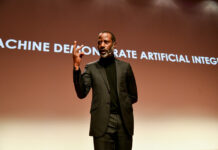By Hamilton Mann
Digital technologies, while enhancing efficiencies, can exacerbate environmental degradation. AI, despite its potential to support sustainable development, is not exempt from these concerns. It is time to create a new model, to agree that the economic value of any business should only be worth the value it creates for society.
Many economic actors around the world are seeking the next generation of new business models, focused, passionate, and stubbornly determined to take advantage of digital technologies, particularly AI, to invent the next Amazon, the next Facebook, the next Google, or another current digital giant.
States, too, are heads and eyes riveted in this Digital gold rush, now AI, and exacerbate this headlong rush, dominated by the thought of economic progress in which new technologies are the Holy Grail.
The market capitalization of the top 100 global companies reached $40 trillion by the end of March 2024, marking a record level in five years. Technology giants recorded the highest growth among all companies, representing nearly one-third of this total market capitalization on their own, particularly due to the excitement surrounding AI.
Paradoxically, the more our society engages in this quest for new business models—by thinking it through the prism of new digital technologies, including those supposed to artificially augment human intelligence—the more we drift away from the invention of what could truly be a renewal of companies’ business models.
Too many companies are so irresponsible that their value creation model destroys precious resources.
So, in this all-digital, and nowadays all-AI frenzy, while sometimes being convinced to the contrary, a succession of business creation is inexorably perpetuated, and the model is, in reality, nothing new. Companies’ business models have remained the same, built from the same reference, the same mold and the same model. This model is called “profit and loss.” And losses include more than what we may think.
Growth for growth, profit for profit, gives the illusion of value but does not create it.
Too many companies are so irresponsible that their value creation model destroys precious resources, accentuating the handicaps of our societies, financing this one-sided value on a debt to humanity, which no balance sheet recognizes, which no bank will come and claim, and which they will never reimburse.
At the heart of the value system of most businesses in the world, inherited from capitalism, this model, often relying on unsustainable consumption of the planet’s resources, has over the centuries become a source of formidable value destruction, rampant at a speed made exponential today by digital technologies which could risk being further accelerated with AI.
This model, which succeeds itself over time with the aim of creating wealth, has on the contrary, become the major cause of the blind impoverishment of what is most precious to humans—such as air or water—all the while thinking that it is innovating on itself.
Developed to its climax, it not only created irreconcilable inequalities with the right to dignity and a decent life for many human beings but also indiscriminately precipitated global pollution and the depletion of necessary natural resources for all human life on Earth, up to the critical stage of extreme and close to irreversible situations.
At its peak, there are these hegemonic platforms, by some erected as a model of entrepreneurial success, often cited as an example of this new digital economy that so many seek to imitate.
This trajectory is well-documented in the Intergovernmental Panel on Climate Change (IPCC) Special Report on Global Warming of 1.5°C, which underscores the urgent need for systemic transformation to mitigate the catastrophic impacts of climate change driven by industrial and economic activities.
There is no need for new studies to confirm that digital technologies, while enhancing efficiencies, contribute to increased energy consumption and e-waste, exacerbating environmental degradation.
AI, despite its potential to support sustainable development, is not exempt from these concerns and can both advance and hinder progress toward the United Nations Sustainable Development Goals, particularly those related to environmental sustainability.
Like generations before us, we continue to move in all possible ways in this model and to transmit it to ourselves as a hereditary disease. Amplified by the multipliers of digital technologies, now AI, not only globalization but unconscious technologization of our world allows the counterproductive effects of these anti-sustainable business models to reach record highs.
Everything happens as if all the entrepreneurial ingenuity of which humanity is capable, as if all the intelligence that characterizes human genius, had for the most part been confiscated to serve only one cause: that of more profits for more money, that of more money for more profits, that of even more profits for even more money for even more profits, in a loop, without any other priority, without any other consideration.
Other such business models, which moreover, would be made more productive and efficient with AI, are not desirable.
We may think that we are on our way forward because of the rise of corporate social responsibility and sustainability trends, but we’re not there yet.
Growth for growth—that which does not participate in making the weakest in our societies grow—profit for profit—that which does not benefit those who need it most—in reality, gives the illusion of value, but does not create it. It creates a loss of reference, a loss of meaning, a loss of who we are, of our humanity.
Long term and short term do not turn into opposing paths as often as we like to believe.
We may think that we are on our way forward because of the rise of corporate social responsibility and sustainability trends, but we’re not there yet. All these trends and concepts change absolutely nothing to the way a company is listed on the stock exchange.
While societal pressure is rising, corporate responsibility and sustainability have emerged as a necessary condition to protect firms’ reputations but are still generally treated as a necessary expense merely because anything more is seen by many as an embezzlement on the backs of the shareholders.
It changes nothing about the way they are valued by the markets.
It changes nothing to the way a company must be run to make what defines profit.
It somehow remains a way of continuing to be stuck in this business model we know, while adding complementary societal prerogatives whose objective of really addressing them are not core to the business and have no life and death effect on the valuation of a company, because all of this stays, in the end, simply peripheral.
We also may think that it is a “David versus Goliath” type of issue, a conflict between the short term and the long term, a never-ending tension between the shareholders’ value and the stakeholders’ value, but it’s not.
The difference between long term and short term does not necessarily turn them into opposing paths. We must move beyond trade-offs. Both must become one.
As long as there will be profit, as defined in the business today, and sustainable development, apart from what defines these profits, as long as there will be value for the shareholders, as defined in the business today, and value for stakeholders, apart from what defines this value, we will not be able to build the cement of an economy at the service of the progress of our societies and humanity.
We must connect the dots looking forward; not connect them looking backward.
Yet we still lack an overall framework for guiding these efforts. However, not knowing what to do does not excuse, and should never again excuse, the act of continuing to do what we already know not to do, from now on.
Steve Jobs said, “You can’t connect the dots looking forward; you can only connect them looking backwards. So you have to trust that the dots will somehow connect in your future.”
He was wrong. There are those things—crucial to humanity and the world—for which we must see ahead and beforehand how the dots are connected and cannot afford to wait and see the consequences to be aware of what we have done afterward.
When it comes to value creation for the profit of the greater interest of humanity, I strongly disagree with him.
We know that all companies that do not oblige themselves to equal opportunities for career advancement for both men and women, destroy a value dear to the development of humanity, because they participate in creating a society where women and men do not have equal freedom to lead their lives, thus creating the foundations of a world where both are not equal human beings.
 We know that all the companies that do not oblige themselves to be administered by a representation inspired by the diversity of the society which supplies the demand that allows them to exist, exclude many human interests, causes and considerations that are essential to the development of our societies, and develop with much greater limits, much greater handicaps, constraining and preventing progress in society.
We know that all the companies that do not oblige themselves to be administered by a representation inspired by the diversity of the society which supplies the demand that allows them to exist, exclude many human interests, causes and considerations that are essential to the development of our societies, and develop with much greater limits, much greater handicaps, constraining and preventing progress in society.
We know that all the companies that do not oblige themselves to think, organize, and implement a supply chain of design of their products and services, taking into account a responsible and ethical use of all the resources necessary for their productions and their distributions — taking into account the social, societal, environmental and human impact at each stage of their process including the management of the end of life of the products and services they create, while ensuring an impact if not equal to zero, put to the credit and not to the debit of the future of humanity — are causing what weakens human capital, degrading our health, our well-being, and our lives, in the present and for the generations to come.
We know that all the companies that do not oblige themselves to take deliberate care, not only of the physical health, but also and especially of the mental health of their employees, are placed among the causes of a sick, deviant and dangerous society for itself, and actively contribute to the increase in accidents of life, inevitably create a fertile ground for violence in our societies, whether it be domestic, child, moral or sexual.
We know that all companies that do not oblige themselves to recruit employees by giving everyone an equal chance to get a job — and even more, that do not discriminate to favor a few to compensate for glaring injustices that divide society — fuel a system in which extreme inequality grows, extreme poverty perpetuates, and extreme temptations to break the law becomes a survival option.
The economic value of a business should only be worth the value it creates for society.
From the perspective of the value creation for the profit of the greater interest of humanity, Steve was wrong: we can and we have to connect the dots looking forward because we cannot act by only connecting them looking backwards and just trust that in the future, the dots will somehow connect by chance on their own.
Inventing a new standard to define economic value is possible.
Changing the rule of what matters to define the value creation of any company by valuing its way of serving society and life in society — rather than serving the growth of growth, and the profit of profits — is possible.
This work requires a new kind of cooperation between business and the States. A cooperation where the company acts in the service of the general interest, and where the States act as an entrepreneur presiding with the intelligence of its citizens over the destiny of the common good.
For an alliance of companies and the States to produce a value that exceeds the sum of what each could bring separately whilst acting in their current sphere of comfort, each must extend its field of action to the sphere of the other. The company must take the initiative to bring the business interests closer to that of society. The state must help build the general framework of a new kind of capitalism that will guide these efforts in search of new complementary stances and measures for what should define profit.
Ethical Value
To what extent should a company implement and enforce ethical guidelines and practices across all operations to maintain trust and integrity, thereby being considered profitable?
Well-being Value
How good should the morale of a company’s employees be, should there be good working conditions, and should the management system be responsible, for a company to be considered profitable?
Health Value
How committed should a company be to promoting physical and mental health, not only within its workforce but also through its products and services, to be considered profitable?
Diversity Value
To what extent should company boards make room for diversity to be able to maximize the full potential of positive impacts that the company can bring in the society in which it grows, to be considered profitable?
Generational Value
How involved should a business be in providing employment for young people, seniors, vulnerable and disabled people to be considered profitable?
Economic Value
To what extent should a business contribute to the fight against extreme poverty and inequalities in the country where it is established to be considered profitable?
Innovation Value
How much should a business invest in the social innovation of the society of which it is a part to be considered a profitable business?
Community Value
How actively should a company engage with and contribute to the local communities in which it operates to be regarded as a socially responsible and profitable business?
Environment Value
How ethical and environmentally friendly should a company’s products and services be — from how they are made, to how they are managed at their end of life — for a business to be considered profitable?
The value businesses seek to create today determines that of tomorrow’s society.
The two most important things in any company do not appear in its balance sheet: its reputation, and its people. Henry Ford got it right in saying that, especially when it comes to the people. It is time.
In this artificial intelligence age, where more intelligence should be made accessible and available, it is of the utmost importance that we use it to build company value creation that would be that of their positive impacts on the society in which they operate and live.
It is not about what some may call social responsibility, sustainable development, or companies with purpose. It is not about philanthropy either. It is about going beyond. It is about changing our conception of what a “business model” should be.
Market capitalization is crucial from this perspective. It plays a key role in reflecting the value of a company’s societal contribution in its valuation, but it is still largely focused on the overwhelming bias toward financial performance.
It’s humanity. This is the most important thing about a company’s balance sheet.
There will be no so-called responsible, trustworthy, or accountable digital technologies—AI included—without responsible, trustworthy and accountable companies with regard to society.
There will be no human-centered AI without humane economics.
The economic value of a business should only be worth the value it creates for society.
The challenge and the urgency oblige us to surpass ourselves and to think big because the definition of the value that businesses seek to create today determines that of the society in which we will live tomorrow.
It calls for a “New Different”, where anything digital or AI must serve the greater good.




 Hamilton Mann
Hamilton Mann































